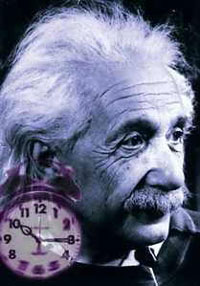 |
|
Germany reclaims Einstein as their
hero | |
Suffering from an acute lack of heroes after
losing two world wars, Germany has reclaimed Albert Einstein as one of its
greatest national figures even though the Jewish physicist fled the Nazis
hating his native country.
A century after the German-born scientist formulated his famous theory
of relativity in Switzerland, and 50 years after his death on April 18,
1955, Einstein is being reclaimed by the country he rejected.
Celebrations of the so-called "Einstein Year" of 2005 are taking place
around the world, but nowhere are the tributes to the man with the
droopy eyes and bushy grey
hair so laden with historical baggage as in Germany.
The German government has
gone all out to latch onto Einstein, who became one of the
world's first pop icons after his theories about space, time and
relativity revolutionised science in the early 20th century.
"It is a bit strange," said Juergen Neffe, author of a German biography
on Einstein that has been near the top of best-seller lists here since it
was published in January.
"Einstein hated the Nazis and extended his hatred to all Germans for
letting it happen. It's certainly true that he hated Germany, but he would
nevertheless be pleased about Germany's development in the last 30 years."
Germany's rediscovery of Einstein began in 2003 when he was picked by
millions of television viewers in a survey as one of the "best Germans" of
all time.
Born in the Bavarian city of Ulm in 1879, Einstein moved to Switzerland
at 17 to evade military service. After graduating from the Polytechnic
School in Zurich he wrote scientific papers in his spare time while
working as a Swiss patent officer.
In 1905, Einstein's "miracle year", he formulated his theory of
relativity, an explanation of the relationship between time and space that
challenged a view of the universe that had stood since the days of Sir
Isaac Newton 200 years before.
Einstein's fame soared in 1919 after his theory was proven. He won a
Nobel Prize in 1921, after which Germany and Switzerland both claimed him
as theirs.
But Einstein didn't stop. His special theory also provided the basis
for his most famous discovery, E=mc2, an equation that opened the door to
the atomic age. The formula is known around the world even if few
understand it.
Einstein returned to Germany in 1914 and lived in Berlin for 19 years
before fleeing Hitler's Nazis in 1933. He took a post at Princeton
University, and spent the rest of his life there.
His house in Berlin was ransacked by the Nazis. Einstein gave up his
German citizenship in 1932 and became a naturalised American citizen in
1940.
(Agencies) |
經(jīng)歷了兩次世界大戰(zhàn)的慘敗,德國人一直苦于自己的國家嚴重缺乏英雄人物,現(xiàn)在他們重新將艾伯特·愛因斯坦視為德國歷史上最偉大的人物之一,盡管這位猶太裔物理學家曾因自己的血統(tǒng)遭到納粹黨人的仇視而流亡國外。
愛因斯坦生于德國,一個世紀前,他在瑞士發(fā)表了著名的相對論。1955年4月18日,他永遠離開了這個世界。50年后的今天,他曾摒棄的國家為他重揚美名。
2005年被稱為“愛因斯坦年”,世界各地紛紛展開各種慶祝活動。但是沒有一個地方像德國一樣,在對這位有著低垂眼睛和濃密灰發(fā)的老人予以盛贊的同時,還要肩負沉重的“歷史包袱”。
德國政府開始竭盡全力了解愛因斯坦。20世紀早期,他關(guān)于宇宙、時間和相對論的理論給當時的物理學帶來了顛覆性的變革,他也由此成為世界上第一位大眾偶像級科學家。
“這有點奇怪。”德國版愛因斯坦傳記的作者于爾根·內(nèi)費說。該書自從一月份出版以來,在暢銷書榜上一直位居前列。
“愛因斯坦憎恨納粹,并將這種反感之情延伸到所有德國人身上,在他看來德國人造成了這一切。他確實非常討厭德國,但是無論如何,他肯定會為德國最近30年來取得的發(fā)展感到欣慰的。”
德國對愛因斯坦的“重新發(fā)現(xiàn)”始于2003年。在當時的一次調(diào)查中,他被數(shù)百萬電視觀眾推選為德國歷史上“最偉大的人物”之一。
1879年,愛因斯坦出生于德國烏爾姆的巴伐利亞市,17歲時,為逃避服兵役,他移居瑞士。從蘇黎世聯(lián)邦工業(yè)大學畢業(yè)后,他供職于瑞士聯(lián)邦專利局,并在業(yè)余時間撰寫科學論文。
1905年是愛因斯坦的“奇跡年”,他創(chuàng)立了闡釋時空關(guān)系的相對論,挑戰(zhàn)了物理學巨人艾薩克·牛頓始創(chuàng)的宇宙觀,那些理論200年來一直固若磐石。
1919年,愛因斯坦的理論為科學家們所證實,一時他聲名鵲起。1921年,他獲得了諾貝爾物理學獎,隨后德國和瑞士都爭著說愛因斯坦是屬于自己國家的。
但是愛因斯坦沒有停滯不前。他的獨特理論也給他最為著名的發(fā)現(xiàn)奠定了基礎(chǔ),那個發(fā)現(xiàn)就是E=mc2——一個打開原子時代大門的方程式。全世界都知道這個公式,雖然沒多少人能真正理解它。
1914年,愛因斯坦回到德國,隨后在柏林居住了19年,直到1933年為躲避希特勒的納粹軍團的迫害而逃亡國外。他曾在美國普林斯頓大學執(zhí)教,并在那里度過了晚年。
他在柏林的住宅曾遭納粹黨人洗劫。1932年,愛因斯坦放棄了德國國籍,并于1940年加入美國國籍,成為一名美國公民。
(中國日報網(wǎng)站譯) |
